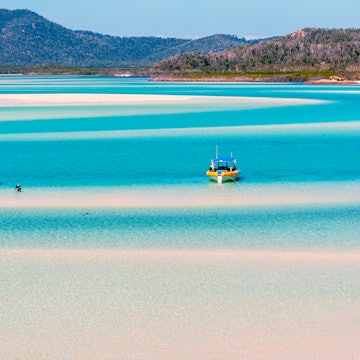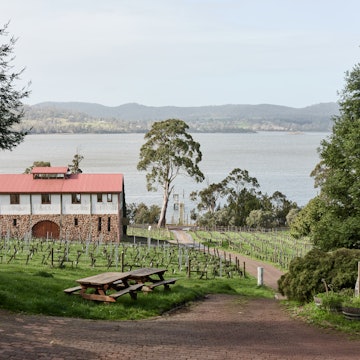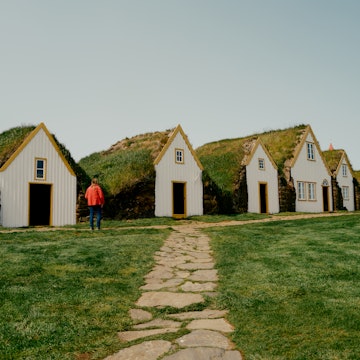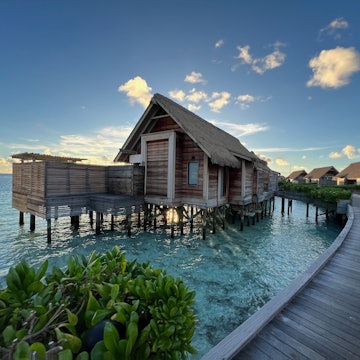

Stroll Hobart's tranquil harborfront past sailing boats and ocean trawlers © Cyrus_2000 / Shutterstock
Anchoring Australia at its southeastern tip, the country's smallest and only island state is a diverse destination that's perfect for independent exploration. Stroll amid the heritage streetscapes of Hobart and Launceston – both now also infused with a discreet cosmopolitan sheen and restaurants showcasing local produce. Road trip to beaches and vineyard-hop past the improbably blue waters of Tasmania's east coast, or venture well off the beaten path down the remote west coast. You can also recharge and relax after outdoor adventures – on two legs or two wheels – with a Tasmanian whisky or craft beer.
In a country as massive and expansive as Australia, Tasmania is a more compact destination where a morning's drive could transport you from arcing beaches and rust-colored headlands to wild and rugged sub-alpine landscapes.

When should I go to Tasmania?
Offering the most settled weather, the best season for travel is Tasmania's southern hemisphere spring and summer from October to March. From December to February the sublime bays and beaches of the Freycinet Peninsula are perfect for day hikes, swimming and kayaking. Just bear in mind that Tasmania is very green for a reason, and it's not uncommon to have the occasional rain shower year-round.
Autumn and winter from April to September offer good accommodation discounts, and it's a great time to bundle up beside an open fire and enjoy Tasmania's excellent food, beer, whisky and wine. Cultural highlights including Hobart's dazzling MONA (Museum of Old and New Art) can be enjoyed year-round, while the six-day, five-night hiking adventure of Cradle Mountain's Overland Track is best undertaken during Tasmania's summer and early autumn (December to April). Look forward to warmer and longer days, and hiking past lakes and peaks framed by alpine flowers.
Popular festivals include March's Ten Days on the Island, enlivening venues around the state with music, literature and film (biennially in odd-numbered years), Dark MOFO, the city of Hobart's winter festival in June, and Taste of Summer, a flavor-packed highlight on Hobart's waterfront for 10 days around New Year's Eve.
How much time should I spend in Tasmania?
Although Tasmania is a relatively small island – it's possible to drive north from Hobart to Launceston in less than three hours – roads can be winding and circuitous in mountain and forested areas. An absolute minimum time would be a week to 10 days, taking in Hobart, Maria Island, the Tasman Peninsula and Freycinet National Park. Extend your travels to two weeks to include a few days of gentle hikes around Cradle Mountain National Park, and time spent enjoying Launceston's relaxed heritage vibe and the history and vineyards of the nearby Tamar Valley.

Is it easy to get in and around Tasmania?
Most travelers arrive in Hobart on direct flights from mainland Australia cities including Sydney, Melbourne and Brisbane. Air New Zealand has seasonal flights linking Auckland and Hobart from October to March. Another option is traveling on the Spirit of Tasmania car ferry from Geelong near Melbourne to Devonport on Tasmania's northern coast. It's a popular route for Australian travelers exploring their nation's most southern state. Tasmania has no train services and relatively limited statewide bus services. It is possible to use buses and shuttles to reach popular destinations like Cradle Mountain and Freycinet National Parks, but having your own transport is essential to reach most other highlights of the state.
Traveling by campervan is also popular, and local and international car and campervan rental companies are represented at Hobart airport and also in the city center. Both Hobart and Launceston are compact and historic cities best explored by walking.

Top things to do in Tasmania
-
Mountain bike down Hobart's kunanyi/Mt Wellington, stopping for a beer at the historic Cascade Brewery, before fish and chips beside the harbor.
-
Take the boat from Hobart's waterfront to be entertained, informed and occasionally bewildered when visiting MONA (Museum of Old and New Art).
-
Learn about Tasmania's tragic and poignant convict history at the Port Arthur Historic Site on the beautiful, but rugged, Tasman Peninsula.
-
Experience the grandeur of the 300m-high sea cliffs of Tasman National Park, either on an exciting boat trip with Tasman Island Cruises, or while tackling the Three Capes Walk.
-
Catch a ferry to Maria Island National Park for coastal mountain biking, more convict history, and to meet a Maria menagerie that includes wombats, kangaroos, pademelons and Cape Barren geese.
-
Negotiate a shaded path around Dove Lake in Cradle Mountain National Park before meeting Tasmanian devils at the Devils@Cradle wildlife refuge.
-
Kayak or walk to remote beaches around Freycinet National Park before lunching on fresh local oysters and premium East Coast wine at the Freycinet Marine Farm.
-
Learn about lutruwita/Tasmania's growing understanding of the state's Indigenous heritage on a walking tour with Wallaby Walkabout Tours in Launceston's Cataract Gorge.
-
Feast on relaxed fine dining and savor some of the world's best cool climate varietals while vineyard hopping in the Tamar Valley's Pipers Brook wine region.
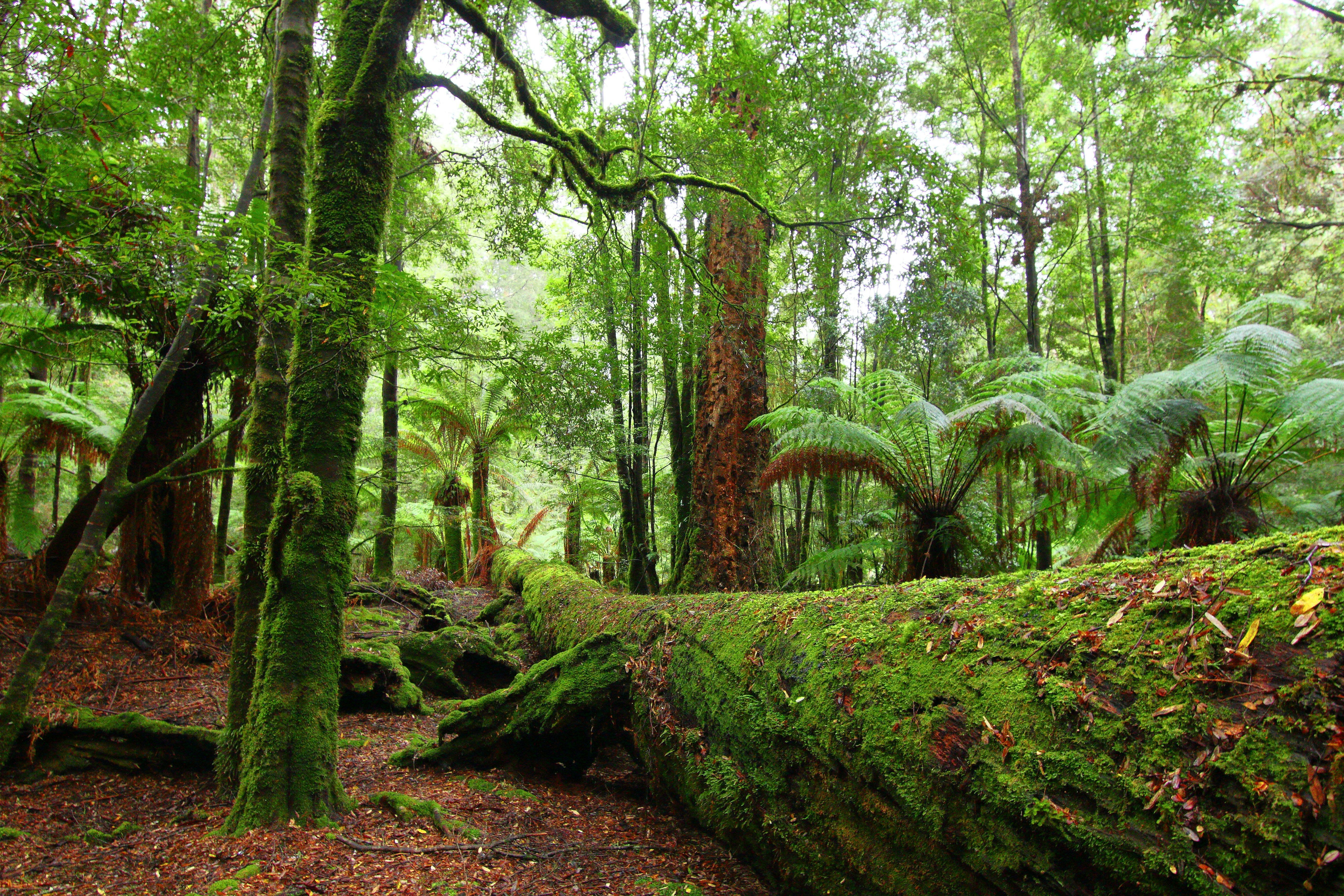
My favorite thing to do in Tasmania
After checking out the surprising dining and craft beer scenes of Launceston, I love to drive down the remote and windswept west coast, starting at colorful and historic Stanley, and then meandering along sylvan and shaded forested backroads on the Tarkine Drive. Continuing south on the isolated Western Explorer Road – it's worth renting a 4WD vehicle for added comfort and security – my final destination is Corinna Wilderness Village, a former mining and forestry hamlet that's the gateway to west coast adventures. Comfortable accommodation is in restored miners' cottages, and days of kayaking on tea-coloured, tannin-laced waters or cruising along the Pieman River in the historic MV Arcadia are topped off with hearty meals and Tasmanian wine in Corinna's Tarkine Pub.
How much money do I need for Tasmania?
Like the rest of Australia, Tasmania is not a budget destination, and accommodation and dining costs can soon accumulate. Supermarkets are more affordable and many travelers self-cater for breakfast. Enjoying the state's food scene at cafes and restaurants is still an essential use of your travel budget.
Distances covered are much lower than on mainland Australia, so you’ll use less petrol in Tasmania. For good-value eating, browse the global array of food trucks at popular markets like Hobart's Farm Gate Market and Launceston's Harvest Market. Many of the state's scenic and natural attractions are free to explore.

Average daily costs
double room in a motel: AU$200-250
double room in a heritage B&B: AU$300-400
entrance to MONA: AU$39
Aboriginal Australia walking tour in Launceston: AU$50
coffee: AU$5-6
pint of craft beer: AU$10-15
glass of Tamar Valley wine: AU$10-15
main course at a pub bistro: AU$25-35
car rental per day: AU$50-70 per day
Always pack plenty of layers
At a latitude of around 42°S and sometimes buffeted from winds sweeping in from the Southern Ocean, Tasmania's weather can often be changeable and capricious. Be prepared with a few layers of warm and dry gear, just in case that sunny Hobart waterfront stroll suddenly takes a different turn.
National Parks for less
Even if you're only visiting Cradle Mountain and Freycinet National Parks, it's worth buying a National Parks Holiday Pass (AU$89.50) from Tasmania's Parks & Wildlife Service. It gives a vehicle and up to eight passengers entry to all parks for two months. Factor in visits to other national parks including Maria Island and you're ahead of the game.
Slow down and take your time
Tasmania may look relatively compact on Google Maps, but traveling around the state will probably take you longer than expected. Roads can be winding and narrow, especially through forests, so just enjoy the drive, don't try and pack too much in – and don’t forget to leave time for the occasional serendipitous detour.














